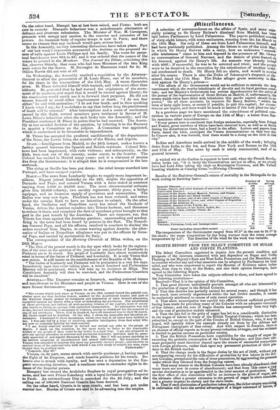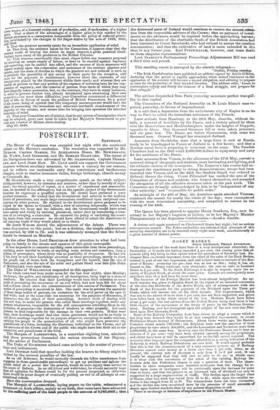EIGHTH REPORT FROM 'ME SELECT COMMITTEE ON SUGAR AND COFFEE
PLANTING.
The Select Committee appointed to inquire into the present condition and prospects of the interests connected with and dependent on Sugar and Coffee Planting in her Majesty's East and West India Possessions and the Mauritius, and to consider whether any and what measures can be adopted by Parliament for their relief, and who were empowered to report the Minutes of Evidence taken before them, from time to time, to the House, and also the ix opinion thereupon, have agreed to the following Report. Your Committee have taken the subjects referred to them, and have agreed to the following resolutions- Resolved—That it is the opinion of this Committee, 1. That Great distress undoubtedly prevails amongst all who are interested in the production of sugar in the British Colonies. 2. That this distress has partially existed for several years; and though it has been much more severely experienced within the last twelve months, it cannot be exclusively attributed to causes of only recent operation.
3. That slave emancipation was carried into effect without sufficient provision having been made for providing many of the Colonies with an adequate command of free labour; and the rate of wages therein has consequently been very high, and the coat of production unduly enhanced.
4. That the late fall in the price of sugar has led to a considerable diminution in the wages of labour in many of the British Tropical Colonies; which has been submitted to, except on the part of the Creoles of British Guiana, who, it may be hoped, will speedily follow the example already set them by the African and Portuguese immigrants of that colony. And with respect to Jamaica, there is an absence of official reports as to any present reduction of wages, and the evidence is limited to partial success on particular estates.
5. That the British Possessions have capabilities for- the supply of sugar far exceeding the probable consumption of the United Kingdom; and that their ulti- mate prosperity must therefore depend upon the means of successful competition with foreign producers, rather than upon any permanent protection of their pro- duce in the British market.
6. That the change made in the Sugar duties by the act of 1846, without any accompanying remedy for the difficulties of production by free labour in the Bri- tish Colonies, precipitated the ruin of these peseeesions, by aggravating the pressure under which they laboured from the foregoing causes. 7. That many estates in the British Colonies have been already abandoned; that many more are now -in course of abandonment; and that from this cause a very serious diminution is to be apprehended in the total amount of production. That the first effect of this diminution will be an increase in the price of sugar, and the ultimate effect a greater extension to the growth of sugar in slave countries, and a greater impetus to slavery and the slave-trade.
8. That if such diminution of production takes place, the richer estates remaimod in cultivation will have the several advantages of a larger command of labour, of
loos wages, of a lessened entire cost of production, and, if such exists, of a higher „„es That a share of the advantages of a higher price in this market by the foivign producer is a consequence inseparable from the policy of reduced protec- tion, established I y the changes in the Sugar-duties by the acts of 1844, 1845,
and 1846. a That the greatest necessity exists for an immediate application of relief.
10. That from the evidence taken by the Committee, it appears clear that the pont mode of levying the duties on sugar imposes a great practical disad- vantage upon many of the producers in the British Colonies. 11. That whereas considerable time must elapse before any measures proposed for securing an ample supply of labour, or laws to be enacted against vagrancy i and squatting, can be carried into effect, and the success of those measures will depend mainly upon the cooperation and assistance of the resident planters and cents, and the state of distress to which the planters are now reduced is such as to preclude the possibility of any outlay on their parts for the reception, still more for the payment or maintenance, however short the contracts, of any immigrants placed by the Government within their reach; and whereas they are unable at present to bear any portion of the expense of enforcing laws for the burl- on of vagrancy, and the removal of persons from lands of which they may too illegally taken possession, but, on the contrary, they have in many instances, is order to prevent further loss, already determined upon abandoning their own nieeerties;—to meet these difficulties, your Committee recommend a differential &di of 10s. in favour of sugar the produce of British Possessions, for a period of six years; being of opinion that this temporary encouragement would have the effect of preventing the immediate and otherwise inevitable abandonment of the majority of the estates, and secure time for bringing into operation the intended measures of relief. 12. That your Committee are of opinion, that in any system of immigration which may be adopted, great care must be taken by her Majesty's Government to pre- vent any renewal of African slave-dealing. May 29, 1848.



























 Previous page
Previous page